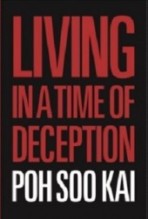(Speech of Prof Dr Paul A Tambyah delivered at the lunch commemorating the 60th Anniversary of the May 13 Student Movement on 13 May 2014)
On behalf of MARUAH and Function 8, I would like to thank all of you for coming here on this Vesak Day to remember the May 13 incident when young Chinese middle school students stood up to the colonial government for dignity and human rights. I am speaking here in my personal capacity, as a member of MARUAH, not representing any organization I work for.
The students’ suppression energized the people of Singapore who came out to support them. Their lawyer – Mr Lee Kuan Yew who was defending the University of Malaya students – went on to found the PAP and as they say, the rest is history.
However, we live in an information age and many of us do not want to simply unquestioningly accept the version of history that is propagated in the schools and in the mainstream media. The work of modern historians has helped us to acknowledge that the Singapore story is more than one man’s personal history no matter how much larger than life he remains. The Singapore story is also the story of courageous men and women who from a young age believed in human rights and democracy. Many were detained without trial or exiled and we honor so many of them who are here today as well as those who have left us.
Why is MARUAH co-hosting the event with Function 8? MARUAH is Singapore’s leading human rights NGO. Led by former NMP Braema Mathi, we have spoken up for human rights in Singapore in a wide range of causes from free elections, abolition of the death penalty, to the rights of the disabled, women and children as well as the economic rights of Singaporeans to fair wages and just employment. We organize events at small venues that are willing to take us and a few committed activists show up. It can be very discouraging and it is amazing how Braema, Michelle and the Exco keep going. One of the more successful ones was the commemoration of the 25th anniversary of the alleged Marxist Conspiracy with Function 8 at Hong Lim Park. It is widely believed that Singaporeans do not care about human rights and democracy or that we are afraid to speak up for our economic rights. But the lesson of May 13, 1954 is that Singaporeans of our parents generation believed very strongly in freedom of speech, freedom of assembly and of the other basic human rights. Did these protests cause social or economic disruption? The answer according to historian Thum Ping Tjun is an emphatic “No – in fact, he points out that the early PAP succeeded in improving the lives of Singaporeans because of the “open debate, resistance and dissent”…He continues that ” The Labour Front and PAP governments both continued successful policies from previous governments and adapted ideas from outside their parties.” He goes on to point out that the “closing down of democratic Singapore has slowly led to less successful policies and increasingly short sighted reforms” That is another reason we gather today – to remind the young activists that there was a time when young people with passion and commitment believed that they had a say in the future of Singapore and they did. And also that when the government was challenged with an organized and coherent alternative, they had to prove themselves to the people of Singapore by coming up with good policies that benefited the people.
The situation today may appear bleak and far removed from the heady days of 1954 but many things are similar. The colonial government used their obvious economic success from 1819 onwards to justify restrictions on free speech and political activity. They used labels such as “communist” or “revolutionary” at their opponents and now other labels such as “xenophobe” or “bigot” or “Marxist conspirator” are tossed around at people whose politics they do not like or who speak up for Singaporeans who are marginalised.
But there is hope even though young Singaporeans can see for themselves that under current policies, they cannot hope for the same standard of living as their parents. As in May 1954, when young people were concerned that they might be left out of the economic progress that seemed to benefit only the colonial rulers, the children of Singapore’s middle class today can only dream of owning a home as centrally located or as large as their parents’. They see Singapore’s prosperity go to the global 1% and cannot dream of the same kind of job security their parents enjoyed and as Ms Sylvia Lim put it in parliament some years ago, their CPF is becoming like a mirage – a virtual body of water that disappears when you get near to it. Young people in Singapore know this. They are not stupid. Some have gone to the extent of climbing onto rooftops to paint slogans on walls. The response has been swift, while the police seem to be unable to catch the numerous loan shark vandals, five young men were arrested last week for graffiti. While we do not condone law breaking, and we do not even know if they are the ones responsible, the energy and enthusiasm of these young people who are too young to vote even in 2016 could perhaps be channeled to other areas such as educating Singaporeans on our basic human rights so we can all make informed choices for our future and for the next generation. The disgruntled youth of today could take a leaf from our pioneer independence fighters to learn how to speak up for human rights and be heard.
Photo credit: Ho Choon Hiong
我代表MARUAH 和Function 8, 感谢大家今天在卫塞节,出席5月13日学生运动60周年,纪念华校中学生为人权与尊严的奋斗。
今天我是代表MARUAH,以个人的身份发表我本身的感言,但不代表我工作的任何组织或机构。
英国殖民地政府对华校中学生的压迫,反而引起新加坡人的支持。李光耀先生是他们的律师。他当时同时也在辩护一组马来亚大学学生。他日后组织人民行动党。以后的历史,你们都知道。
我们现在生活在一个信息时代,大多数不会单纯或毫无疑问地接受主流媒体或在学校传播的历史版本。现代历史学家的研究,以帮助我们了解,新加坡的故事不只是 一个人的个人历史。新加坡的故事,也包括许多勇敢和相信人权与民主的年轻人的故事。这些年轻人,许多遭遇未经审判被拘留或被逼流亡海外。今天我们感谢这组 勇敢的人士,也缅怀那些已经离开我们的伙伴。
为什么MARUAH 支持Function 8,一起举办这项活动? MARUAH是本地的人权组织。在前官委议员Braema Mathi小姐的带领下,我们对于许多广泛人权问题提出建议,如选举系统,废除死刑,残疾人士,妇女和儿童的权利。在这,也要感谢Function 8 之前举办纪念“光谱行动”25周年的活动。Function 8 提醒我们大家,不能忘记我们的过去与历史。
相信大家普遍认为,新加坡人不关心人权和民主的问题,又或者是大家不敢提出关于人权的话题。但1954年5月13日的学生运动,证明我们父母一代的新加坡人,对于言论自由,集会自由,和其他基本人权原则拥有非常强烈的意识。
难道当时抗议活动,活跃的媒体,或火热的议会辩论,导致社会或经济混乱?根据历史学家Thum Ping Tjin,答案是“没有”。事实上,他指出,人民行动党早期的成功,出自于公开辩论与抗议活动的环境。劳工阵线和人民行动党,双方都延续上一任政府所成功 实行的政策,也融入自己政党以外的意见。他也指出,新加坡过后间接缩小的民主空间导致了僵硬的政策和狭窄的改革。这也是我们今天聚集的另一个原因,也就是 要提醒现在年轻的积极分子,当年也一批热诚的年轻人,挑战政府推出了惠及万民的政策。
现在我们面对的状况,远离1954年的激动人心的日子,但许多情况还是类似的。英国殖民地政府从1819年起,就以经济成就来辩护对言论自由和政治活动的 限制。当时,他们以“共产主义”或“主张暴力革命者”的标签,用在他们的对手。现在,类似的标签,如“排斥外人”或“马克思主义阴谋家”,也同样的被用来 压制不同的意见。
希望还是有的,即使现在年轻的新加坡人不能希望拥有他们父母年代同样的生活水准。就如50年代期间的人担心他们无法享受经济发展的成果,现在中产阶级的孩 子,对拥有一间类似他们父母一样大一样地点方便的组屋,只能当作是一个难以实现的梦想。几年前,林瑞莲议员在国会发言,表示人们的公积金变成像海市蜃楼, 当你越靠近它,它越消失。新加坡的年轻人已经意识这一点。他们不傻。几天前有几个年轻人爬上屋顶涂鸦反行动党的标语。这些年轻人连下一届大选时都不能投 票。我们当然不纵容违法的举动,但这些年轻人的精力和热诚,或许能够转移经过其他方式,例如教育新加坡人对我们的基本人权,让我们对未来和下一代做出明智 的选择。今天的心怀不满的年轻人可以从我们的先锋独立战士学习,推广人权与民主











